Agender: Meaning, Identity and History
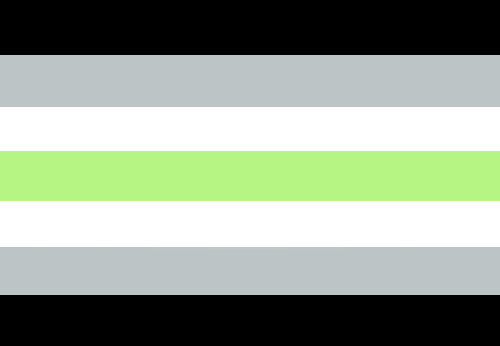 Agender flag
Agender flag
Agender is a term that refers to people that do not have a gender or choose not to present as a specific gender. The term agender is used to describe someone’s gender but it essentially can be defined as “without gender”. An agender person may often refer to themselves as being without a particular gender, lacking specific recognizable gender expression or specific gender identity, having undefinable gender, being gender neutral or genderless.
Agender people typically are under the transgender and nonbinary genders umbrella when talking about gender identities, but that does not mean they are trans. The term agender means that agender people feel they have non gendered identities but that also does not mean they are nonbinary people. Some agender people say they are gender free, others think of themselves as gender neutral.
Table of Content
Agender Terminology
According to the Merriam-Webster dictionary, the definition of agender adjective can be applied to any individual who has an “internal sense of being neither male nor female, nor some combination of male and female or being a person whose gender identity is genderless or neutral.”
In many instances, agender people can talk about themselves as nonbinary, but they may also use one of the following when discussing gender identities.
- Gender free
- Gender neutral
- Gender blank
- Choose not to label themselves
- Lack of gender
- Neutrois
- Null gender
- A human being rather than a gender
In an interview with TeenVogue Dr. Meredith Chapman, a psychiatrist at the Children’s Health Genetics Program in Dallas, Texas which works with children and teens who deal with gender dysphoria said: “There’s a lot of overlap in the terminology. Agender typically means being genderless, without a gender identity, or gender-neutral. Terms used by the healthcare community and transgender and gender-nonconforming people are constantly changing and progressing. Definitions are not always agreed upon or set in stone. Genderqueer, nonbinary identities and gender-nonconforming are some terms used to describe an individual whose gender identity does not match with the binary model of gender like man/male/boy or woman/female/girl. A person who sees themselves as neither man nor woman has no gender identity or no gender to express.”
Some see the term agender as an oxymoron of sorts. Since the terminology around gender is constantly evolving and changing, describing someone who lacks gender as “agender person” may be considered incorrect in the very near future.
Oftentimes people who are agender prefer not to put a label on their gender identity or the lack of it at all. There are those that want the label to stick around as a declaration of themselves and being a part of the LGBTQ+ community.
History
Despite popular belief, the term agender was not originated when someone it on Tumblr. A 1998 book for educators on LGBT College Students referred to some people as “ungendered”, but the following words do have their roots on the Internet. Just like so many words used to describe gender identity “agender” is fairly new. As previously stated, it was first documented online in 2000 when a user posted a message talking about religious beings in different cultures as being agender.
It took 5 years for the word to be used again in reference to identifying LGBTQ+ people. Eventually, the word simply took off and by the time 2013 came around, New York Times used it in its main article talking about LGBTQ+ and specifically agender people.
Recently the queer community has been embracing the letter A in the LGBTQA+ abbreviation for agender community among the other words typically associated with the abbreviation like asexuality, aromanticism, ally.
Flag and Symbols
The Agender flag was first created in 2014. The Agender flag features seven horizontal stripes. The black and white stripes represent on the flag the lack of gender. The agender flag gray represents semi genderlessness and the central green stripe on the agender flag can be referred to as identifying as non binary genders or even other gender.
The black, gray, and white colors are used twice and the green stripe is only used once in the middle on the agender flag.
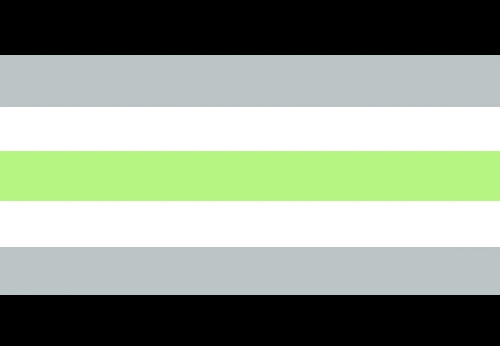 Agender flag
Agender flag
There is also a fairly recent alternate version of the agender flag. This five stripes agender flag means the following
- Turquoise is for agender liberation
- Lime is for agender community, love, and friendship
- Yellow is for joy and celebration
- Orange is for art and creativity
- Red is for individual expression and diversity
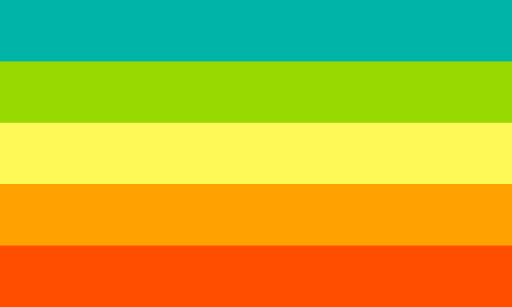 Genderless flag (alternate flag)
Genderless flag (alternate flag)
A four stripe version of the agender flag is also available online. It means the same as the above colors but does not include the red color.
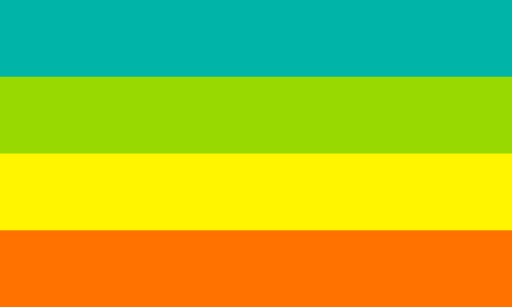 Four-stripe version of the Agender Genderless
Four-stripe version of the Agender Genderless
There are also a few agender symbols out there. The most frequently used is a circle with a line through it. The circle represents genders. The line can be drawn either horizontally or diagonally. It represents the fact that gender is crossed out or fully absent for someone.
 Main Agender Symbol
Main Agender Symbol
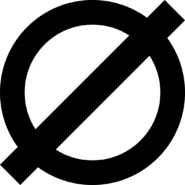 Another gender symbol” data-result=”success”>Another gender symbol
Another gender symbol” data-result=”success”>Another gender symbol
In another version which is quite similar to the neutrois symbol, a line has no prongs.
 Alternate agender symbol
Alternate agender symbol
The less common agender symbol features a plain circle, it is also a symbol that sometimes represents asexuality. That’s why not a lot of people use it.
 Alternate agender symbol 2
Alternate agender symbol 2
Agender Pronouns
Agender people can use a variety of pronouns and the language may differ in cultures around the world. Most people who identify as agender prefer to avoid gendered pronouns while referring to themselves. In some cases, the language may have masculine or feminine properties, but overall agender individuals tend to use they/them pronouns.
They can present themselves in masculine, feminine, or both ways or completely outside the gender binary. Agender folks do not have to use either male or female pronouns. They often choose pronouns that correspond with non binary identities.
The agender pronouns typically do not reflect their biological sex at birth. Agender people prefer to stick to non gendered language when raising the questions of how they like to identify.
Since being agender can fall under the transgender umbrella, some agender people may experience gender dysphoria and even seek hormone replacement or surgeries available to trans people.
Am I Agender?
Being fluent in the language of gender is not easy. Many people tend to confuse the terminology. There is no right or wrong answer when it comes to discovering how an individual prefers identifying in the future.
Not all agender people have a gender identity that falls under the umbrella, and some people may find it more fitting to refer to themselves by the terminology they simply feel is correct.
One of the famous people who identified themselves as agender is Indya Moore. In a now deled tweet the Pose superstar said: “I’m nonbinary, femme, Agender feels fitting too. My pronouns: they/them/theirs. I correct people often. At times they ignore me & I tolerate it to avoid conflict/irritation but it’s upsetting to feel like I’m ‘too much in a world that takes so much from trans people constantly.”
Anyone can identify as agender regardless of their sexual orientation or the gender that was assigned to them at birth.
Famous Agender People
Many celebrities identify outside the gender binary. Some of them prefer to use terms like genderfree, agender, genderless, or gendervoid.
- Actor Ellie Desautels
- Rapper Angel Haze
- Astrophysicist Amita Kuttner
- Model Juno Mitchell
- Actor Indya Moore
- Comedian DeAnne Smith
- Poet and Writer Bogi Takács
- Writer Eris Young
Is Agender the Right Term for You?
There is no right or wrong answer here. It all depends on how a person chooses to identify themselves. The term may feel the most fitting at a particular moment, so a great way to figure out whether it is the right fit for you is to start using the word to describe your gender.
- Learn the terminology
Read articles, watch videos, find relevant content on being agender
- Discover other people’s experiences
Seeing what others’ went through may help point you in the right direction on your journey
- Think about it
Does it feel right? What does the word mean to you? Does it change your perception of yourself at all? Ask yourself these and other questions before deciding to use the term agender or genderless.
- Seek support
Connecting with people in the LGBTQ+ community who may have the same experience may help answer your questions and find support while discovering yourself.
- What if the term does not fit?
It is absolutely fine to discover and evolve. There may be a term that you find more fitting. It is not an issue to refer to your gender by new terminology. This does not change it or invalidate it by any means. It simply shows new language has the right to exist.
Finding an identity that feels right can not only keep LGBTQ+ people safe, but also lower the staggering rate of mental health, self-harm, and suicide.
Supporting Agender People
Learning the language is one part of it. Using the correct pronouns is another. A huge step in understanding each individual’s gender is acknowledging their struggles.
The fact that many people still fail to understand the subject of being non-binary and agender is hard to dismiss. If you or someone you know identify as agender there are several ways to seek and show support.
Educating people around by pointing out resources that define the terminology is the right path to take when it comes to applying the terms in real life.
Learning about pronouns or name change, respecting the change, and applying it in conversation.
Actually showing your support by answering calls for assistance and help.
Providing space to talk about being agender and learning about someone’s gender identity.
If you want to be more welcoming and supportive of agender people, do not be afraid to speak up. Whether you are LGBTQ+ or an ally, you have a voice that can play a key role in proving support and changing societal misconceptions about agender individuals.
Differences and Comparisons
Is Agender the same as Gendervoid?
Being gendervoid also means lacking gender, but it can also refer to a person’s feeling of void when it comes to someone’s gender identity.
Is Agender the same as Gender nonconforming?
The terms agender and gender nonconforming can overlap but they do not mean the same thing. A gender nonconforming person does not conform to the gender norms that are expected of them, that does not mean they are agender.
Is Agender the same as Asexual?
Some people confuse the two terms. Agender people can be of any sexuality but they do not have a gender. So do not view this is as a sexual thing. Asexual people do not have a sexual attraction to others, while agender folks – do.
Is Agender the same as Nonbinary?
Nonbinary is an umbrella term that refers to a range of genders that do not fit the male or female category. Although agender is in the nonbinary category, not all nonbinary people are agender. Some may have a variety of identities they prefer using.
Is Agender the same as Genderqueer?
Genderqueer people do not exclusively identify as female or male. The word essentially means their gender identity does not conform to the mainstream.
Is Agender the same as Genderfluid?
Genderfluid means that a person’s gender shifts over time.
So, yes one can identify as nonbinary, genderqueer, gender fluid and agender at the same time if they see fit.
Helpful Agender Resources
Whether you are thinking about your gender identity or know someone who is agender or simply want to find out more information there are several resources available online.
- Neutrois is a place for anyone who thinks they may be neutrois, agender, or genderless.
- Genderqueer. have an extensive list of resources on gender identities
- Transgender Care Listings has a helpful list of resources for nonbinary people.
Agender is a term that may feel appropriate for a person that simply does not feel like they identify with any gender in particular. The precise meaning of the term varies, it lives on a gender spectrum and becomes alive with a person that chooses to use it. The agender word may be used by agender people to describe themselves based on their own feelings, beliefs, and identity.
It is a word that may be the right fit for someone who does not like to feel that they need to identify with a particular gender at all. Some people choose words like gendervoid, gender null, or genderless to refer to themselves and their agender identities.
Finding the right labels can connect people with their inner self and be a life-altering experience.
Share this post:
What do you think?
 Agender flag
Agender flag


